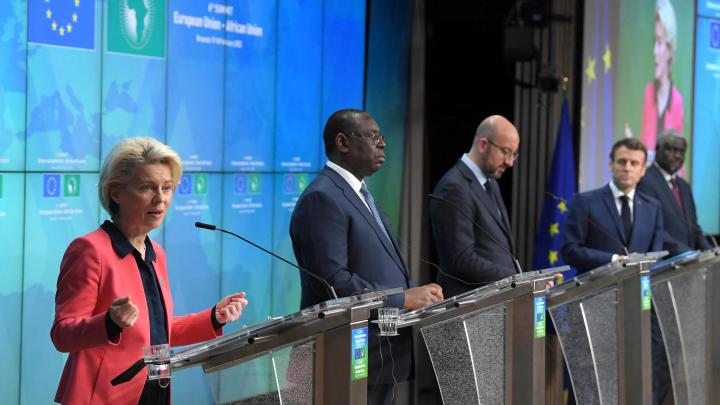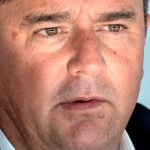ISS TODAY OP-ED
African Union financial independence key to forging stronger international partnerships

The African Union’s reliance on international funding affects its ability to set priorities and take ownership of solutions.
In a rapidly shifting global order and with continued threats to Africa’s security, the African Union (AU) must strengthen ties with multilateral bodies and governments outside the continent. So far, it has struggled to extend engagements beyond its traditional partners — the United Nations (UN), European Union (EU), United States (US) and China.
The UN and EU are the African bloc’s biggest partners, and the EU is the largest contributor to the AU’s budget. Funding is a major issue shaping the continental body’s external relations and often results in collaborations driven more by partners’ priorities than Africa’s. The AU relies heavily on partners to fund its activities, with two-thirds of its 2023 budget drawn from external sources.
The AU-EU relationship is formalised through summits and regular official interactions. Their respective security arms exchange information and undertake joint field missions. Collaboration between the AU and UN is governed by the 2017 peace and security framework and the 2018 Joint Framework for the Implementation of the AU’s Agenda 2063. Annual AU-UN conferences are also held.
These interactions help parties pool resources, improve coordination and undertake joint assessment missions. Common positions are agreed on pressing security challenges, including using sanctions in conflict situations. Efforts have also been made to align decisions of the AU Peace and Security Council (PSC) and UN Security Council (UNSC). While there have been dividends, the PSC still complains of being marginalised in the UNSC.
The AU has long-standing ties with the US on security, governance, economic growth and climate issues. The US-backed recent AU attempts to resolve the Ethiopian war and supported the fragile Sudan and Chad transitions. At the inaugural democracy summit in 2021, 16 AU states committed to bolstering democratic initiatives.
China’s cooperation with the AU on security has seen it send soldiers to peacekeeping operations in more than a dozen African countries. China also provides the AU with technical assistance, capacity building, technologies and equipment to help it combat piracy, terrorism and other threats. Exchanges on maritime security, logistical support, military education, training and medicine are notable.
Visit Daily Maverick’s home page for more news, analysis and investigations
A major challenge to productive partnerships is the AU’s continued overreliance on funding from the EU and others. That has led to gaps in priority setting and ownership of Africa’s peace and security agenda.
In 2016, the AU established a peace fund to provide predictable funding and enhance its financial autonomy. But the goal of financing 25% of Africa’s security activities remains unmet. To date, states have contributed only $60-million against a targeted $400-million. Added to this is the longstanding problem of how the UN can better contribute to AU peace support operations (PSOs).
The AU funding situation means international partners’ interests often drive partnerships. The European Peace Facility, for example, allows direct funding for a broad range of continental peace support operations, even those not authorised by the PSC. These include African military coalitions, national armies such as in Nigeria and Mali, and Gulf of Guinea coastal states’ militaries and navies. This breaks the norm of channelling funds through the AU — a move that could prove counterproductive.
The AU-US partnership appears primarily driven by geopolitical competition. The new US strategy for Africa promotes transparency and accountability, strengthening democracy and reducing regional instability. It focuses on post-pandemic recovery, economic opportunities, and the climate crisis — but also aims to counter the expanding influence of China and Russia in Africa.
The AU lacks a coherent strategy for engaging partners. Its relations with Japan, for example, have no clear focus on security. Japan has supported strengthening PSC-UNSC ties, democracy, and issues relating to women, youth and children in armed conflict. But its triannual Tokyo International Conference on African Development concentrates primarily on Africa’s development agenda.
The AU needs to focus on the quality, not just quantity, of its partnerships. To yield more security dividends, it must deal with perennial challenges that undermine its external collaborations. A sound strategy for AU interactions is vital, as is finalising the draft partnerships policy framework by the February 2023 deadline.
AU capacity to plan and manage peace support operations needs bolstering. Decisions on financing security activities must be quickly implemented and financial oversight mechanisms enhanced.
Key to reducing the AU’s reliance on international partner financing is ensuring that member states pay their dues, as required by their statutory commitments. Hopefully, the launch of the revitalised AU Peace Fund and formation of a board of trustees by the AU Commission chairperson, announced on 5 December 2022, will lead to action in the short term. DM
Institute for Security Studies (ISS) PSC Report team.
First published by ISS Today.


















Comments - Please login in order to comment.